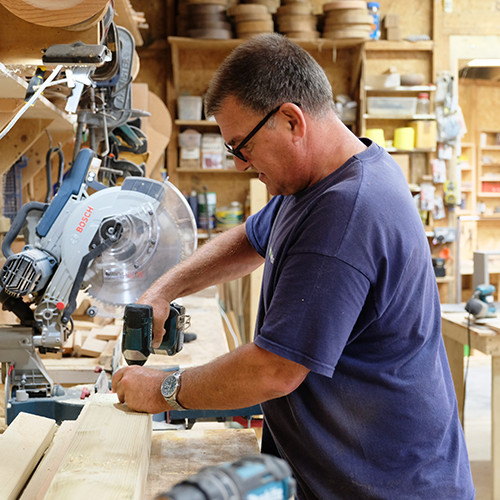LandWorks
Providing a safe and supportive halfway house between prison and the community
From its site on the Dartington Estate in Devon, LandWorks provides intensive, wraparound support, occupational training, and a strong community for people leaving prison. Trainees are helped to shake off their criminal identity and rebuild their lives with meaning and purpose, so that they can go on to find jobs and become valued members of society.
 LandWorks was established in 2013 and became an independent registered charity in 2016. It welcomed its first four trainees to a donated Portacabin in a bramble-covered quarry field. The trainees helped to clear and develop the site, building a basic workshop, laying pipes and paths, and planting vegetables.
LandWorks was established in 2013 and became an independent registered charity in 2016. It welcomed its first four trainees to a donated Portacabin in a bramble-covered quarry field. The trainees helped to clear and develop the site, building a basic workshop, laying pipes and paths, and planting vegetables.
The site has since grown to include a kitchen to teach the trainees cooking skills, a market stall to sell its produce, and pottery and carpentry workshops. The charity also offers counselling to help people understand the causes of their offending, therapy to help address substance misuse or mental health issues, tailored resettlement services and peer support. LandWorks says it provides “a consistent and supportive environment in which trust can develop and change can happen”.
While lived experience is key to its ethos and many of its staff are former graduates of the programme, the charity is careful that trainees are not trapped by their criminal identity, and learn to see their potential beyond the justice system.
In 2022-23, the employment rate for economically active LandWorks graduates was 94%, whereas only 30% of adults leaving prison are in employment within the first six months of their release. And the reoffending rate is just 5.2% – far lower than the national rate of 37% for adults released from custody.
Around 200 trainees have taken part in the LandWorks programme over its 11-year lifespan, at an average cost of £7,000 each, while the cost to the state of a single prison sentence and probation is closer to £70,000.
Former chief inspector of prisons, Nick Hardwick, has supported LandWorks since its inception. He said: “Ministers should note that LandWorks provides one of the best examples in the country of how we can reduce reoffending, turn lives around and prevent future victims.”
The charity has now secured funding to package up its decade of evaluation evidence and present it to policymakers in a bid to convince them to replicate the model in other places, and potentially in different formats, such as BikeWorks, CarWorks or FloristryWorks. The charity’s founder and CEO, Chris Parsons, believes that resettlement ought to be viewed through a public health lens rather than a criminal justice lens, and hopes to persuade the Department of Health to take it forward as a public health programme.
Sharika Sharma, head of business development at CCLA, said the work LandWorks is doing is “incredible, intensive and so badly needed”. She was impressed by Parsons’ ambition to scale up and roll it out to other settings.
Anne Fox, CEO at Clinks, described Landworks as a highly innovative model of tackling recidivism. “The way that they have created that community, it’s just different gravy, it really is. There’s just something nice about how they work – they’re very, very person-centred.
“And because of politically where we are right now, any work supporting people to leave the criminal justice system that focuses on their right to do so in a positive way, really needs to be celebrated. It isn’t even the economic argument that we need to make, it’s the argument that it’s ok to invest in offenders.”
Martin Edwards, CEO of Julia’s House, added: “They are doing everything right. The way they treat people with dignity and respect is so important, and they have a model that works. It seems to me that if you were just out of prison, this is the best place you could land.”
CC Reg no. 1166057
